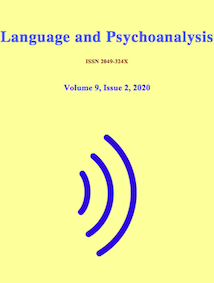Heidegger and Lacan
Language as Beyond the Communication
Abstract
Lacanian psychoanalysis cannot disregard its debts to philosophy, especially continental philosophy. Lacan’s conception of language is derived from multiple philosophical sources (i.e., Plato, Aristotle, Kant, Hegel, Kierkegaard) including Heidegger’s philosophy of language and pride of place. Heidegger’s view of language prepares the ground for reversing the relationship between language and human beings, overcoming common sense about language and the communicative model of language. Language is much more than a set of labels; it shapes the human world and structures social relations themselves. In addition, language acts as a social link. The function of language as a social link allows us to think of it in relation to the Law and the very function of this human subjectivity. In reference to the Other of the Law and language, the subject finds her recognition, and this implies that the language is not reducible to communication. The process of technical-scientific domination of Western institutions leads to a reduction of their functions to the formal aspects, which may lead to a reification of the human as well as a state of alienation.
References
Alparone, D. (2018). Dell’ignoranza della Legge. Una riflessione tra psicoanalisi e filosofia del diritto. Tigor: rivista di scienze della comunicazione e di argomentazione giuridica, 10 (2), 94-103.
Alparone, D. (2019). Riconoscimento e soggettivazione in relazione sincronica. Politica.eu, 5(1), 66-79.
Althusser, L. (1996). The Tbilisi affair. In O. Corpet, & F. Matheron (Eds.), Writings on psychoanalysis (pp. 79-125). Columbia University Press.
Avitabile, L. (2004). La filosofia del diritto in Pierre Legendre. Giappichelli.
Cimatti, F. (2016a). Wittgenstein on animal (human and non-human) languages. Linguistic and Philosophical Investigations, 15, 42–59.
Cimatti, F. (2016b). Philosophy and psychoanalysis: Wittgenstein, on “language-games” and ethics. In A. Capone, & J. L. Mey (Eds.), Interdisciplinary studies in pragmatics, culture and society (pp. 233-250). Springer International Publishing.
Cimino, C. (2019). Le origini del riconoscimento nella costruzione del soggetto. Lacan con Winnicott. In J. M. H. Mascat & S. Tortorella (Eds.), Hegel & sons. Filosofie del riconoscimento (pp. 281-290). Edizioni ETS.
Di Ciaccia, A., & Recalcati, M. (2000). Jacques Lacan. Un insegnamento sul sapere dell’inconscio. Bruno Mondadori.
Franco, P. L. (2018). Ordinary Language criticisms of logical positivism. Hopos: The Journal of the International Society for the History of Philosophy of Science, 1(8), 157-190.
Gurgel, I. (2009). Linguaggio. Attualità Lacaniana. Rivista della Scuola Lacaniana di Psicoanalisi, 10, 167-169.
Heidegger, M. (1996). Being and time. A translation of Sein und Zeit. State University of New York Press. (Original work published 1953)
Heidegger, M. (1984). Early Greek thinking. Harper & Row. (Original work published 1954)
Heidegger, M. (1982). On the way to language. Harper & Row. (Original work published 1959)
Heidegger, M. (2008). Towards the definition of philosophy. Continuum. (Original work published 1987)
Heidegger, M. (2013). Logos (traduit par Jacques Lacan). Le Portique. Revue de philosophie et de sciences humaines, 31, 1-14.
Honneth, A. (2014). Freedom’s right. The social foundations of democratic life. Columbia University Press.
Houdebine, A.-M. (2005). Linguistique et psychanalyse. In A. de Mijolla (Ed.), Dictionnaire international de la psychanalyse. Hachette Littératures.
Lacan, J. (2017). Formations of the unconscious. The seminar of Jacques Lacan. Book V. Polity Press. (Original work published 1957-1958)
Lacan, J. (2006). The function and field of speech and language in psychoanalysis. In J. Lacan. Écrits. WW Norton & Company. (Original work published 1966a)
Lacan, J. (2006). The subversion of the subject and the dialectic of desire. In J. Lacan. Écrits (pp. 671-702). WW Norton & Company. (Original work published 1966b)
Lecoeur, B. (2016). La lingua che parliamo. La Psicoanalisi, 60, 32-44.
Legendre, P. (1989a). Droit, communication et politique. Entretien avec Daniel Dayan et Jean-Marc Ferry. Hermes, 5-6, 21-32.
Legendre, P. (1989b). Leçon VIII. Le crime du Caporal Lortie. Traité sur le Pére. Fayard.
Luhmann, N. (1996). The reality of mass media. Polity Press.
Marret, S. (2012). Le commandement du surmoi au temps de l’inexistence de l’Autre. In C. Delourme, I. Alfandary, & R. Pedot (Eds.), Lire depuis le malaise dans la culture (pp. 115-127). Hermann.
Meyer, A., V. (2007). Le discours de Rome : point d’inflexion de la psychanalyse. Revue française de psychanalyse, 71(5), 1689-1694.
Michels, A. (2013). Dogmatic montages as a challenge to psychoanalysis. European Journal of Psychoanalysis. Retrieved from http://www.journal-psychoanalysis.eu/dogmatic-montages-as-a-challenge-to-psychoanalysis/.
Nelson, E., S. (2017). Heidegger’s black notebooks: National socialism, antisemitism, and the history of being. Heidegger-Jahrbuch, 11, 77-88.
Perniola, M. (2004). Contro la comunicazione. Einaudi.
Richardson, W. J. (2003). Heidegger and psychoanalysis? Natureza Humana, 5(1), 9-38.
Romano, B. (1989). Il diritto tra desiderio e linguaggio. L’autocoscienza in Hegel e l’inconscio in Lacan. Bulzoni.
Romano, B. (2002). Filosofia del diritto. Laterza.
Woodson, H. (2020). “Right Step (Albeit in the wrong direction)”: Žižek on Heidegger’s nazism and the domestication of Nietzsche. International Journal of Žižek Studies, 14(1), 1-12.

This is an Open Access journal. All material is licensed under a Creative Commons Attribution 4.0 International (CC BY 4.0) licence, unless otherwise stated.
Please read our Open Access, Copyright and Permissions policies for more information.








